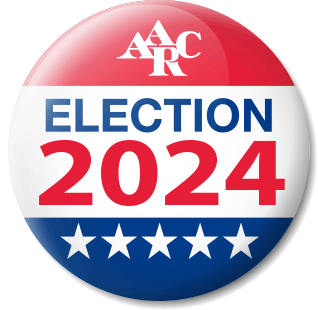Director-at-large
Keith Siegel
Sleep Advocate, PAP Adherence RT
rtNOW
Member Since: 1988
AARC Activities:
- HOD Immediate Past-Speaker (2019-2020);
- Director at Large (2021-present)
- AARC Committees: Social Media — 2013; Bylaws — 2008, 2009, 2015 (Bylaws Committee Chair, 2009); Audit Sub-Committee — 2014, 2016 (Audit Sub-Committee Chair, 2016); Finance Committee – 2014, 2016; Advocacy & Government Affairs — 2016, 2019-present; Strategic Planning Committee – 2019, 2020; Ad Hoc Committee on Respiratory Therapists and Disease Management
House of Delegates Activities:
- Delegate, Maine Society for Respiratory Care: 2004–2013, 2015
- Treasurer: 2014
- Speaker-elect: 2016
- Speaker: 2017–2018
- Past-Speaker: 2019–2020
- HOD Committees: Orientation, Elections (Co-Chair), Delegate Assistance
Affiliate Activities:
- President, Maine Society for Respiratory Care, 1999
- President-elect, 1998
- Past-President, 2000
- Delegate, 2004–2013, 2015
- Director-at-Large, 1997
- Political Advocacy Contact Team (PACT) Representative, 2007–2020
Related Organizations:
- Board of Directors, American Lung Association of Maine, 1998–2009
- Public Policy Advocacy Committee, American Lung Association of Maine, 2011–2016
- Pediatric Asthma Advisory Committee, American Lung Association of Maine, 1991–1998
Education:
- Certificate – Respiratory Therapy, Southern Maine Vocational Technical Institute, 1981
- RRT – Southern Maine Community College, South Portland, Maine, 1992
- Bachelor of Science, Business – Southern New Hampshire University, 2013
- Master of Business Administration (MBA) – Southern New Hampshire University, 2016
Publications:
- Siegel K, (2017). 2017 GOLD recommendations. AARC Times, 41(11): 14-16.
- Sullivan J, Pravosud V, Mannino DM, Siegel K, Choate R, Sullivan T. (2018) National and state estimates of COPD morbidity and mortality — United States, 2014-2015. Chronic Obstr Pulm Dis. 5(4): 324-333. DOI: http://dx.doi.org/10.15326/jcopdf.5.4.2018.0157
- Pasquale C, Malanga E, McCreary G, Siegel K, Clark W, Mularsky R, Yawn B. (2019) Developing a Self- Report Tool for Collecting COPD Medicines [Abstract]. Chest. 156(4): A1613-A1614.
- DOI: https://doi.org/10.1016/j.chest.2019.08.1419
- Oakes, D. F., Shortall, S. P., & Jones, S. (2022). Oakes’ Ventilator Management: An Oakes Pocket Guide. (K. D. Siegel, Ed.) (5th ed.). Respiratory Books.
Elections Committee Questions:
What do you see as the biggest challenge facing the profession of respiratory care, and what do you recommend the ARC do to address it?
The biggest challenge facing the respiratory therapy profession is the risk of losing practitioners to other healthcare fields due to limited manpower in their institutions, limited professional growth, and a limited scope of clinical practice. Like other healthcare professions, these issues were made far worse by the unprecedented strain the COVID pandemic placed on respiratory therapists.
The AARC is well-positioned to lead the charge in addressing all these challenges. The AARC has implemented several strategic initiatives to address these and other challenges. The AARC has worked to increase the visibility and recognition of the respiratory therapy profession. This includes partnering with other organizations to advocate for policies that support the profession and raise awareness of the vital role that respiratory therapists play in the healthcare system. This work is ongoing, and the future of the RT profession is exciting because of it.
Healthcare is changing more rapidly than ever. What ideas do you have to help today’s respiratory therapist meet these changes?
There are several ways respiratory therapists successfully face the changes happening in healthcare today. To help respiratory therapists meet the changing healthcare landscape, they can embrace technology, stay current with research, collaborate with other healthcare professionals, focus on patient education, and advocate for their profession. By leveraging technology, staying informed, working collaboratively, educating patients, and promoting their profession, respiratory therapists can provide the best possible care to patients and stay ahead of the curve.
In addition to ongoing education, it’s also important to promote diversity within the respiratory therapy workforce. A diverse workforce can help improve patient outcomes, as patients may feel more comfortable receiving care from providers who share their background or culture. By recruiting and retaining a diverse workforce, respiratory therapy can better meet the needs of all patients and help reduce health disparities.
Role-Specific Questions:
Your role as Director-at Large is to represent the general AARC membership. If given the opportunity to represent, how would you use your skills and experience to advance and advocate for the respiratory care profession?
As a member of the AARC Board of Directors, it is very important to engage with the membership, stay informed about the latest trends and issues, advocate for the profession, collaborate with other stakeholders, and always prioritize the membership’s interests. By following these simple, yet important guidelines, the AARC Board of Directors can make a positive impact on the profession at all levels, and help ensure that respiratory therapists receive the recognition and support they deserve.







